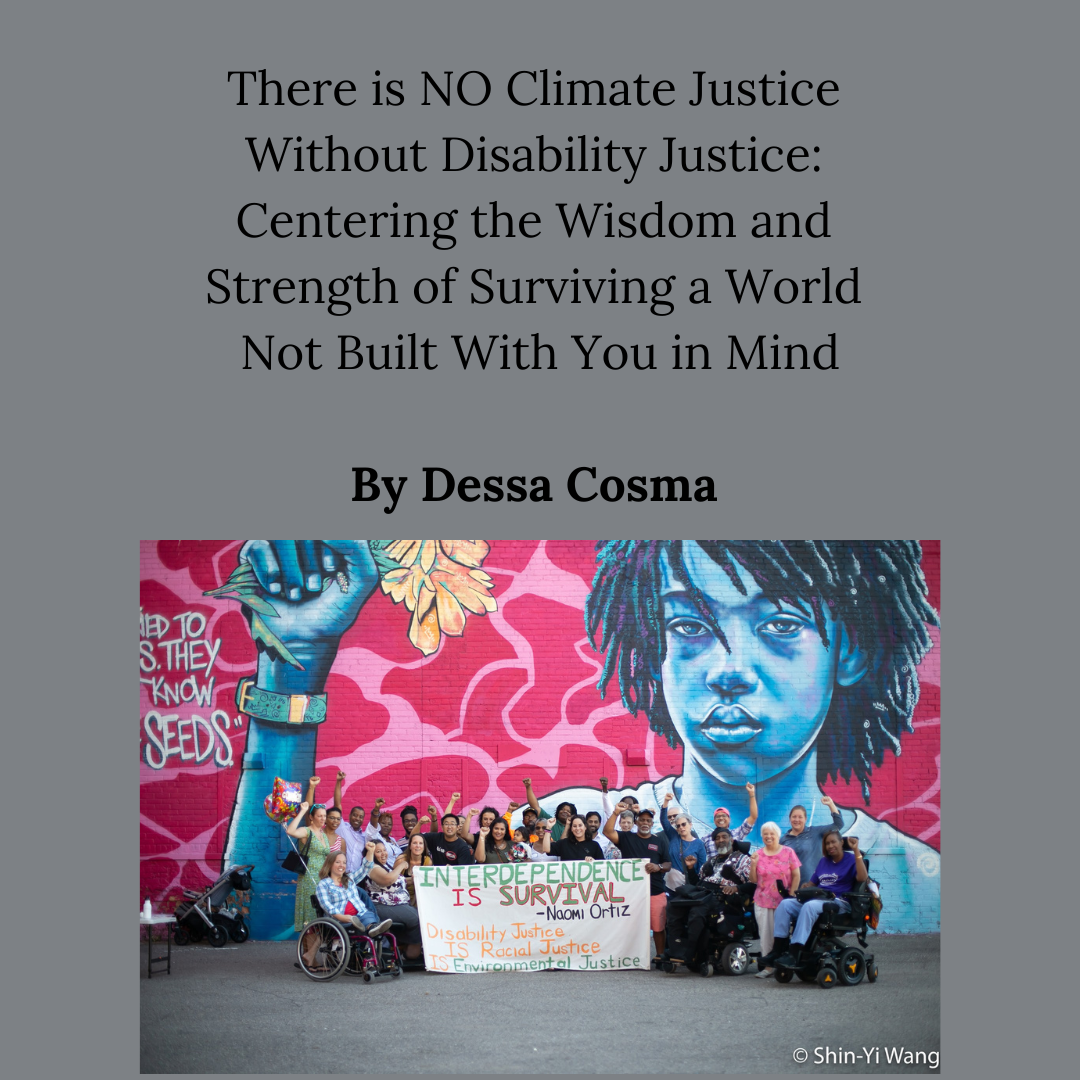At first thought, it may not be obvious how disability justice is critical to climate justice, but once you dig in, there are crucial points of intersection.
First of all, like all issues in our community, climate justice has a disability angle because a quarter of our overall population is disabled, a number that is even higher in low income and communities of color– not coincidentally, the same communities that face the greatest environmental racism. Environmental impacts on people’s minds and bodies are well documented. We know that in Detroit, zip codes with a heavy industrial presence have high rates of cancer and asthma, both of which are disabilities. We also know that oppression, including ableism, racism, sexism, and homophobia, have damaging impacts on people’s mental and physical health.
In addition to this systemic and intersectional big picture analysis, there are very practical and concrete questions we must ask–and collaboratively answer–if we care about how disabled people will fare during climate chaos and how we can build climate resiliency that is accessible and inclusive for all the people in our communities.
- In crises like hurricanes or floods, is evacuation accessible? Is emergency communication accessible? Is there a plan for disabled people who rely on public transit? For those who live in congregate settings? For those who need accessible buses and/or to take medical equipment or service animals with them?
- When we are developing/redeveloping infrastructure for resiliency, are we building in highly accessible ways so that all of us can benefit and survive? We already have an accessible, affordable housing crisis in Detroit and around the country. As regions like Michigan become “climate havens,” are we preparing to welcome all kinds of people?
- Climate chaos in itself is disabling. What we are putting into our air water and soil have negative impacts on the body. Not to mention the harm to our mental health due to this existential crisis. How can we ensure public policies and corporate practices don’t further degrade our earth and our health?
- Disabled folks, especially those with chronic illness, are often the “canary in the coal mine,” as our bodies can be more sensitive to changes in the environment. As a result, we tend to get sick first. We also tend to have valuable survival strategies that others will need at some point. For example, disabled folks already knew about masks and respirators due to living through wildfire smoke on the West Coast. This was invaluable info as COVID rocked the world, though few leaders thought to ask disabled people for our life saving input. How can we learn from disabled people before it’s too late?
I am a disabled Detroiter who came to this city after Hurricane Katrina devastated my hometown of New Orleans 18 years ago. While the hurricane itself was a natural disaster, like those we will be facing at increasing frequency and intensity due to climate change, much of the devastation for people on the Gulf Coast was human made. The wanton industrial pollution that is allowed to continue at the hands of greedy corporations coupled with the divestment in infrastructure and shared community resources that destabilizes our safety during natural disasters, is actually a perfect storm for major catastrophe, dehumanization, and ultimately loss of life. And while I wasn’t in New Orleans when Katrina hit, I will never forget the images and stories of disabled residents stranded and abandoned because disaster planning hadn’t adequately included them.
As with any marginalized group of people, disabled people are negatively and disproportionately impacted by decisions made without us in mind or at the table. And yet, we also have the wisdom born of our survival in such realities that is not only helpful to us but for everyone. When it requires tenacity, patience, critical thinking, creative problem solving, knowing when to ask for help, planning ahead, and adaptability for something as “simple” as going to the grocery store, because our society wasn’t designed with disability in mind, doesn’t it make sense to have disabled folks leading in the biggest fight our species has ever faced?
Additional resources to check out for further learning:
Sins Invalid, a disability justice focused performance project that creates a lot of art about the need for climate justice.
Connections Between Climate Change and Disability, a resource library from Disability & Philanthropy Forum
Disaster Relief Often Leaves Disabled People Behind. Disabled First Responders Are Changing That.
Disability in a Time of Climate Disaster from Harvard University
Analytical study on the promotion and protection of the rights of persons with disabilities in the context of climate change – Report of the Office of the United Nations High Commissioner for Human Rights
Bio: Dessa Cosma is the founding director of Detroit Disability Power. She is a long-time social justice organizer, fortunate to spend her career working for reproductive, racial, economic, and disability justice. She is committed to bridging the gap between disability inclusion work and other social justice efforts in order to build big, powerful movements that dismantle interlocking systems of oppression. In addition to organizing, Dessa also enjoys facilitating workshops, gardening, traveling, and reading. She lives in Detroit with her partner, their cat, and copious plants.


